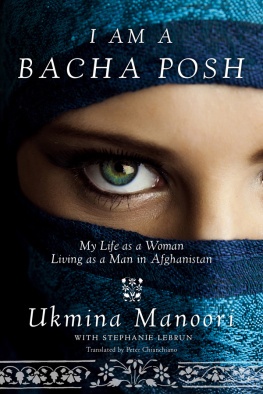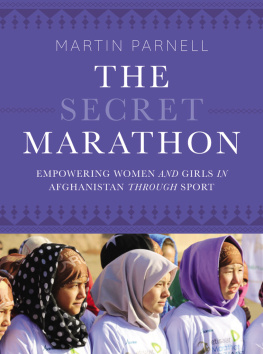Copyright 2013 by ditions Michel Lafon
Translation copyright 2014 by Skyhorse Publishing, Inc.
Previously published as Je suis une bacha posh in 2013 by ditions Michel Lafon
All rights reserved. No part of this book may be reproduced in any manner without the express written consent of the publisher, except in the case of brief excerpts in critical reviews or articles. All inquiries should be addressed to Skyhorse Publishing, 307 West 36th Street, 11th Floor, New York, NY 10018.
Skyhorse Publishing books may be purchased in bulk at special discounts for sales promotion, corporate gifts, fund-raising, or educational purposes. Special editions can also be created to specifications. For details, contact the Special Sales Department, Skyhorse Publishing, 307 West 36th Street, 11th Floor, New York, NY 10018 or .
Skyhorse and Skyhorse Publishing are registered trademarks of Skyhorse Publishing, Inc., a Delaware corporation.
Visit our website at www.skyhorsepublishing.com.
10 9 8 7 6 5 4 3 2 1
Library of Congress Cataloging-in-Publication Data is available on file.
Cover design by Laura Klynstra
Cover photo credit Thinkstock
Print ISBN: 978-1-62914-681-2
Ebook ISBN: 978-1-63220-001-3
Printed in the United States of America
CONTENTS
FOREWORD
T hey are called bacha posh, literally girls dressed as boys. At birth, their parents decided this: that their daughter will change appearance, name, and identity. She becomes, in the eyes of everyone, the son of the family. Its an old Afghan tradition that effectively permits families without a son to cross-dress one of their daughters to preserve the honor of the family. In this society, dominated by masculine values, it is frowned upon not to have a son and is overall impractical: a girl cannot work, cannot go out alone to provide for the home, cannot help with manual labor; a girl is a burden. All you need to do is cut her hair short, and she can perform tasks reserved for men. A bacha posh, according to Afghan superstition, may also help ward off bad luck and favor the birth of a boy in the family.
In Afghanistan, thousands of girls must cross-dress starting at a young age. There are no reliable statistics, however. This practice is ongoing and discreet. The parents do not say loud and strong, This is my daughtershes a bacha posh! but rather, This is my son! In the villages, they wear the traditional dress of men, the shalwar kameez, pants and a long shirt. In Kabul, the capital, they are dressed in jeans and hooded sweatshirts, they play soccer and tennis, they go with their mothers to the bazaar, they defend their little sisters on the playground, they are the men of the family when the fathers are not there. However, who is fooled? Who forgets that underneath the shalwar kameez is a little girls heart that beats? Close relatives and neighbors play along, tooeven religious officials. They do not condemn the parents who make this choicethey even encourage it sometimesand they do not see any offense to Islam, up to a certain point...
At puberty, there is no more question of playing along; at this time, the problem is serious and must be adjusted in a much simpler way: go back to the original plan. Girls must forget the shalwar kameez, wear a niqab , go back home, learn the domestic tasks, get ready for marriage and maternity... in short, embrace the role intended for women. The mullah keeps close watch on the recalcitrant who would like to live in sin, those who lie about their identity. The recalcitrant? The rebels? Those who refuse to become women in the eyes of society because they have had a taste of the mens freedom cannot be renounced. How many of them exist? Still, no statistics, but the subject is taboo.
We want to talk about these women. From the age of twelve, when their families tell them they must wear a dress and a veil, they suffocate just to imagine themselves dressed as such. They grew up as boys, they played with them, went to school, went shopping, they were free like them. And then one day their parents, the district mullah, their relatives, all tell them its over, all of it. No more tennis training, even if you are the champion of Afghanistan, no more school, even if you had planned on continuing your studies, no more friends, even if you have known them your whole life, no more short hair, no more life without constraints; you will become a woman. For many of these young girls, it is already too late.
Imagine: you are raised as a boy, you grew up with this plan, and then tomorrow someone tells you to dress, move, compose yourself, think, and act like a girl. For some, it is simply impossible. So they cling to this lie they have been living since birth. They go out alone, without a veil, work at their own free will, go to school, and play sports... They resist their transforming bodies; they hide their chests. To be a bacha posh is, for them, a way of surviving in a society marked by a conservatism that makes women second-class citizens: deprivation of freedom, violence, and unjust laws. Today, 80 percent of Afghans are still illiterate.
At sixteen years old, the social pressure of the emotional blackmailing becomes too much: You are offending Allah in cheating your own identity; you bring the shame onto your family. Many give up at this point and abandon with regret their shalwar kameez, their jeans and their tee shirts; they learn to polish their nails, wear makeup and dresses and put on the veil, and sometimes to disappear beneath a burqa . But they will never be women like the other women: they will live in the nostalgia of an ideal past; more so than the other women, they will know of the gap that separates the women from the men in Afghanistan since they once lived on the other side. Some also say the trauma will help them in the end: Azita Rafat, a former bacha posh who became a political leader, says that during her childhood as a boy, she developed the strength and independence of mind to dare to put herself forward as a candidate in the elections. And so there are others, those who do not give it upthey persist, refusing to let go of their mens clothing and way of life. They commit the sin to stay disobedient women. They are rare and keep quiet, because they risk their lives. They are driven by their mental strength to transform, to give themselves appearances so masculine that they pass by unnoticed: they become men among men. And in their mens disguise, they defy the authorities.
Ukmina is one of these people. She was born in the mountains of southern Afghanistan, in the vicinity of Khost, near the border of Pakistanin a Pashtun region where an ethnic group strongly upholds their traditions and codes and where women live closed off beneath their burqas. At her birth, her father decided she would be the son of the family. She grew up playing boys games with the responsibility to look after her mother and her sister. At puberty, she refused to obey, against her fathers will and that of the religious authorities. She thus opened the door to an extraordinary fate. She lived through the war against the Soviets; she ran away into the mountains and helped the Mujahideen . She acquired the name Ukmina the Warrior and the eternal respect from the men of her village. At the end of the conflict, it was too late to turn back. Under the Taliban regime, she had to hide herself, but she did not abandon her mens clothing. At the reinstatement of democracy, she took her pilgrim stick and knocked on every door in the villages of her district to convince the women to vindicate their rights. Some years later, drenched in triumph at the Council of the Province of Khost, she shook the hand of President Karzai. Ukmina, illiterate and penniless, tread the soil of New York in March 2012, invited to participate in the presentation of a prestigious award in the presence of Michelle Obama and Hillary Clinton.













